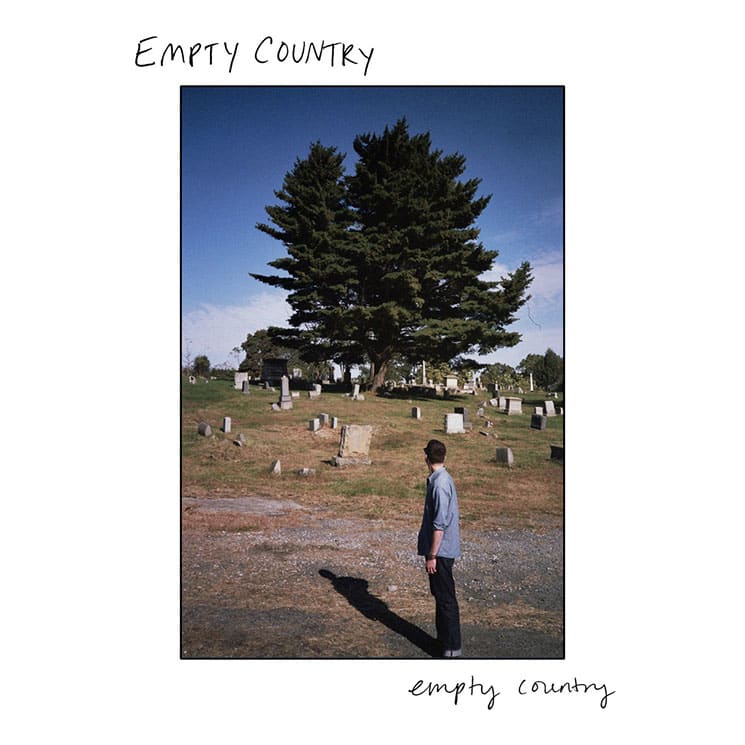Over the course of ten years, New York-based band Cymbals Eat Guitars evolved from a Wrens-worshipping group into a crowd-rousing rock band with big, booming arrangements. They found an audience among Pixies and Modest Mouse fanatics, and when that scene died down, they continued to evolve and ended up in the arms of the emo revival. Now, singer-songwriter Joseph D'Agostino has moved forward, following the band's split in 2017, looking for yet another revitalization with his solo project Empty Country.
Empty Country is an engaging, wonderfully arranged and rewarding record. D'Agostino puts his own spin on Americana that feels both new and old. Despite being made with a back-to-basics approach, with the help of only a small number of people close to D'Agostino — the record features his wife and sister-in-law on backup vocals and several friends and neighbours as his band — it comes out feeling fully realized and then some. No detail is spared, and just about every section is expertly composed and arranged to make the songs as enticing and immersive as they can be. It shares something in common with Sturgill Simpson's enchanting A Sailor's Guide to Earth, both in its musical approach and its lyrical perspective.
Following the rumination on death that was Cymbals Eat Guitars' acclaimed 2014 record LOSE and the embrace of being alive that was its followup, Pretty Years, D'Agostino now searches for sources of hope amid an ongoing fear of loss.
Some of it is very personal. "Ultrasound" has the fuzzy rambunctiousness of the late '90s era of the Promise Ring, while D'Agostino worries during a scary wait for his wife's medical results. "We try to sleep / We're spinning 'round / A shadow on the ultrasound." The music-box lullaby "Chance" slowly wraps you up in a lush orchestra, holds you there comfortably, then sings you into a blissful stupor; the song is a tribute to his father-in-law, Robert "Chance" Browne, the cartoonist who drew the comic strip Hi and Lois.
Meanwhile, D'Agostino has also poured himself into short fiction, resulting in songs that skew more surreal and at times idiosyncratic. "Marian" is a sprawling showstopper about a West Virginian miner in 1966 who gets blackout drunk and predicts his own death while talking to his sleeping wife. "Becca" is a simple, almost jaunty folk-rock tune about a woman tricking people into going blind looking directly at a solar eclipse.
Throughout, D'Agostino's words are intricate and so tangled in detail that the stories are obscured; it's more like flipping through a photo album without footnotes — you're not told the story, but you feel the impression it leaves on you. The songs can be dark and dissonant, and they can be bright and hopeful. It's a record about falling in love, finding pure joy in parenthood, and worrying about the ones you love. It is tender and at times destructive, as D'Agostino finds comfort in the things that are good in life, lashes out at his fears, and repeats this cycle until his foe is, for now, vanquished.
(Independent)Empty Country is an engaging, wonderfully arranged and rewarding record. D'Agostino puts his own spin on Americana that feels both new and old. Despite being made with a back-to-basics approach, with the help of only a small number of people close to D'Agostino — the record features his wife and sister-in-law on backup vocals and several friends and neighbours as his band — it comes out feeling fully realized and then some. No detail is spared, and just about every section is expertly composed and arranged to make the songs as enticing and immersive as they can be. It shares something in common with Sturgill Simpson's enchanting A Sailor's Guide to Earth, both in its musical approach and its lyrical perspective.
Following the rumination on death that was Cymbals Eat Guitars' acclaimed 2014 record LOSE and the embrace of being alive that was its followup, Pretty Years, D'Agostino now searches for sources of hope amid an ongoing fear of loss.
Some of it is very personal. "Ultrasound" has the fuzzy rambunctiousness of the late '90s era of the Promise Ring, while D'Agostino worries during a scary wait for his wife's medical results. "We try to sleep / We're spinning 'round / A shadow on the ultrasound." The music-box lullaby "Chance" slowly wraps you up in a lush orchestra, holds you there comfortably, then sings you into a blissful stupor; the song is a tribute to his father-in-law, Robert "Chance" Browne, the cartoonist who drew the comic strip Hi and Lois.
Meanwhile, D'Agostino has also poured himself into short fiction, resulting in songs that skew more surreal and at times idiosyncratic. "Marian" is a sprawling showstopper about a West Virginian miner in 1966 who gets blackout drunk and predicts his own death while talking to his sleeping wife. "Becca" is a simple, almost jaunty folk-rock tune about a woman tricking people into going blind looking directly at a solar eclipse.
Throughout, D'Agostino's words are intricate and so tangled in detail that the stories are obscured; it's more like flipping through a photo album without footnotes — you're not told the story, but you feel the impression it leaves on you. The songs can be dark and dissonant, and they can be bright and hopeful. It's a record about falling in love, finding pure joy in parenthood, and worrying about the ones you love. It is tender and at times destructive, as D'Agostino finds comfort in the things that are good in life, lashes out at his fears, and repeats this cycle until his foe is, for now, vanquished.
